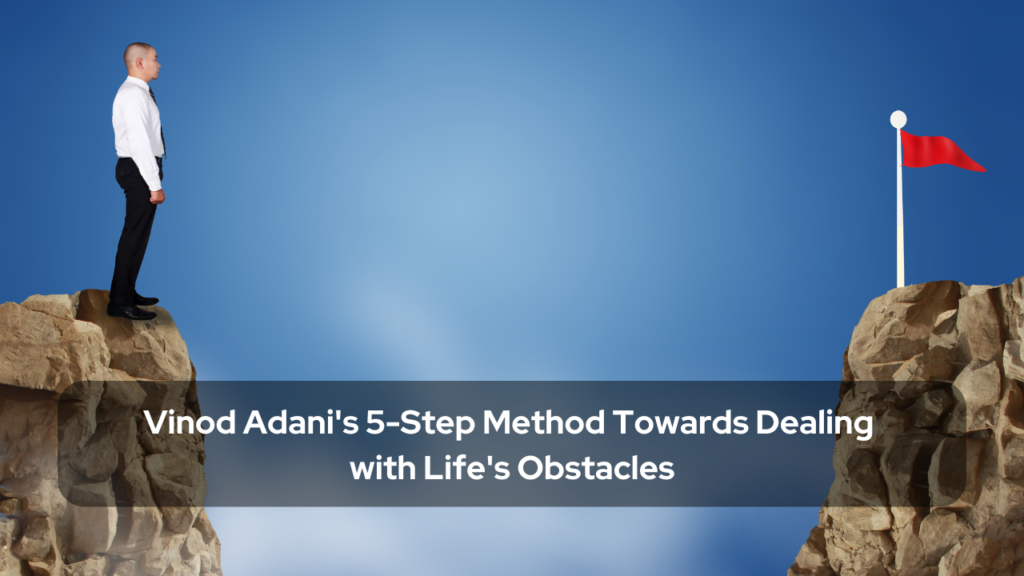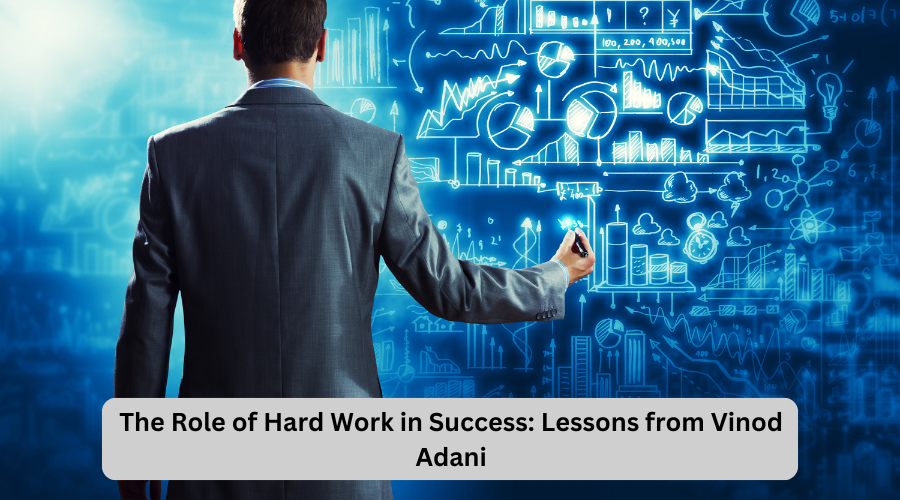Life has a journey related to several roadblocks; people sometimes face many obscenities. An obstruction can come in almost any form; be it career-related issues, financial problems, or personal life ones. The way one deals with these presents defines their journey. Famous motivational speaker Vinod Adani comes forth with the 5-step process on how to overcome each obstacle in this article by learning from his experiences and observed expertise developed over the years. This solution is practical in its nature while fostering mental set shifts about resilience and confidence in handling adversity.
Each of Vinod Adani’s steps would be discussed in this blog, and by what extent these principles can help towards growth and success.
Step 1: Acceptance and Acknowledgment
Acceptance is one of the very first and most important steps taken when overcoming any kind of opposition. According to Vinod Adani, acceptance and recognizing the difficulty is the initiation point to personal growth. He states that denial or avoidance simply sustains the burden and adds more tension. Reality acceptance makes its way clear for people to approach it with clarity and determination.
Acceptance does not necessarily mean giving up or resigning yourself to the obstacle. It means realizing what the obstacle is without having a sense of guilt or outrage, which can be directed toward oneself or others. This acceptance sets the stage for creating an action plan and moving on positively.
How to Use It:
- Recognize Your Emotions: Accept your feelings, whether it is fear, frustration, or disappointment. Recognizing your emotions enables you to process it constructively.
- Accepting Reality; It’s time to forget the what-if-ness of things and dwell in the here and now. Acceptance defines the situation as it really is and opens the door to enter solution-oriented thinking.
Step 2: Reframing Your Perception
Vinod Adani truly believes that reframing ideas can turn tricky situations around best. One has a tendency to look at a given situation from a negative perspective if one fails to overcome an obstacle. The change in this line of narration would lead one to a solution-oriented mindset.
Challenges should be looked upon as experience opportunities, as well as growth and self-improvement, says Adani. When focus is shifted from what’s going wrong to what can be done so that improvement could be made in a situation, people will likely once again be in charge and hopeful.
How to Use It:
- Identify Negative Cycles of Thoughts: Learn the patterns of cyclical negative thoughts that actually magnify the problem. Challenge those negative thoughts by asking if they are facts or just a guess.
- Growing Mindset: Turn every problem into an opportunity to grow and learn. The fear of failure must not paralyze you but instead, learn from failure as a stepping stone to success.
Step 3: Develop a Stepwise Action Plan
Once this hurdle is sighted and reframed, the next step would be to create a concrete action plan. To Vinod Adani, structuring sets the plan, thereby breaking down a challenge into manageable things, rendering people incapable of feeling overwhelmed and ensuring that all their efforts are working toward the solution at hand.
The way Adani formulates an action plan is by putting together tangible goals so that one can set a timeline for doing each item. Progress, according to Adani, happens step-by-step achieving small victories you start gaining momentum toward major accomplishments.
How To Apply It:
- Specific and Realistic Goals: Break it down to smaller tasks into which a goal can be set. In this manner, it will keep you focused on the right thing and propel you forward.
- Create a Timeline: Set deadlines for each task and be flexible to change the timeline if unexpected issues come up. Organizing and having a plan helps you feel more in control and focused on what you want to achieve
Step 4: Seeking Support and Staying Connected
That is the time one will require friends, family, mentors, or professionals to assist someone to get back on course. Vinod Adani motivational speaker also puts it thus, “Don’t lose touch. Keep in touch with people, nurture that wellspring of encouragement, guidance, and the broader perspective during trying times. He further adds, “When a person isolates, this one amplifies the feelings of tension and despair.”.
The shame of asking for help is a thing of the past for him. Said Adani, asking for support is a boost to one’s resilience, yet also provides people with new insights and solutions regarding new ways learned from others’ mistakes.
How to Apply It:
- Network of Trusted People: Find the people you may come to for guidance, encouragement, or even just to listen. A network of supportive people is what will keep your emotional well-being intact as you weather difficult circumstances.
- Embracing Teamwork: You do not have to do it all by yourself, ever. The power of teaming up lies in collaboration; sometimes it brings innovative solutions and new outlooks.
Step 5: Resilience and Adaptability
The final step that Vinod Adani applies is making people resilient and adaptable. Obstacles are rarely stagnant; they keep changing, and so should your approach when you meet them head-on. Resilience involves keeping positive even in setbacks and pursuing your goals with persistence.
According to Adani, the flexibility ability means being flexible with the changing circumstances and hence subject to change my strategies accordingly. One must be open to pivoting sometimes rather than sticking to some rigid approach. This makes you proactive and responsive to new challenges that may come your way.
How to Practice It:
- Accept Change: Believe that change is inevitable, but try to use it as an opportunity for growth rather than something that threatens your plans.
- Learn from Failure: Reflect on what you’ve been wrong on and learn what you can from them. Instead of calling it a failure, enjoy it as a stepping stone for development.
Life Application: Real-Life Success Stories
The first beneficiary of Vinod Adani’s approach is a young entrepreneur who managed to incur a major economic loss during the early days of her startup. When all of her key investors backed out, she was disheartened but chose to implement Adani’s 5-step approach.
She started by accepting the reality of things and acknowledging her fears and disappointments. With such clarity, she focused the setback on lessons that she can learn from it and created very detailed action plans in terms of alternative funding options and contacts that she could reach out to in her network. This means that over time, she makes the changes to align the business models with market demands and is a good example of resisting failure. Today, her venture is doing quite well, and she attributes the same success because she had followed this systematic approach.
Conclusion
- Awareness: This is the first step to identify the problem and know your emotions.
- Positive Attitude: The change of attitude makes you focus on the solution rather than the problem.
- Planning: The proper planning of the work provides specific goals to the action.
- Emotional Support: The construction of a network of people who support you keeps you grounded and motivated.
- Flexibility and Persistence: Remaining resourceful and flexible enables you to face changing circumstances with greater confidence.







